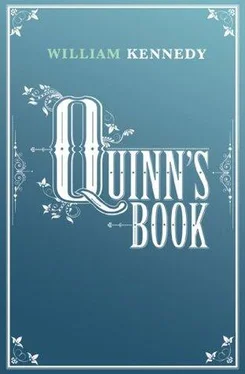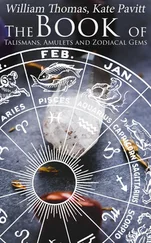“But a cloud covered it.
“And I made my escape.”
Quinn nodded and smiled. Magdalena needed no more.
“If a butterfly.
“Turned into a caterpillar,
“Where would be the loss?”
Quinn narrowed his smile, spinning with Magdalena as he did so, wondering how to respond.
“Those are quite short poems,” he finally said.
“I never write long poems,” said Magdalena. “My longest was about my trip to the bottom of the river.” She closed her eyes, straightened her neck.
“Four gleaming clamshells
“Danced for my pleasure.
“The mud fairies made me a shawl
“Of luminous eelgrass.
“I died of death
“Until the sword of the sailor
“Pierced my heart,
“And I ascended again
“Into the land of sorrow.”
“Someday I must write about your poetry so people will know you are more than a dancer,” Quinn said, shamed by his deception, pleased by his politesse. He wanted to be as honest with Magdalena as she was being with him. Perhaps he would write about her. She was a striking woman. He could even write of her body, of which he had had privileged sightings, in the Dood Kamer and under the garden arch.
“That would be very kind of you,” Magdalena said to him. “When are you going to kidnap Maud?”
“What’s that?”
“I know she’s asked you. Hasn’t she?”
“She told you?”
“She didn’t have to. She’s been asking men to kidnap her ever since she was eight years old.”
“No.”
“Everybody knows that about Maud.”
“I didn’t know it.”
“She doesn’t tell her kidnappers.”
“She’s been kidnapped before?”
“Never.”
“I don’t understand this.”
“She doesn’t want to be kidnapped. She only wants to talk about being kidnapped. That way she doesn’t have to make any decisions about the future. When things get difficult she invites someone to kidnap her.”
“That seems madcap.”
“Yes, doesn’t it?”
“Has Maud always been madcap?”
“As long as I’ve known her.”
“How long have you known her?”
“Since she was born.”
Maud Lucinda Fallon was born in 1837 of a twin and a tenant farmer, and distinguished herself at the age of two by reciting the Ave Maria in its entirety, in Latin. Her mother, Charlotte Mary Coan, and her father, Thomas (Thomsy) Fallon, both denied having instructed her, and both claimed utter ignorance of Latin.
Maud began a diary at age four and filled notebooks with poetic language her parents could understand only marginally. The source of her gift was made suspect by the parish priest in Athlone and her writing was not encouraged. When she was five her notebooks were sent to a schoolmaster for evaluation and Maud never saw them again.
Maud’s life lost what little formal structure it had when her father joined a tenant farmers’ rebellion and was arrested and shipped to an English prison. He escaped en route and found his way to Canada, from where he sent money back to Charlotte, a young woman of spirit, whose gift was for music and dance. Charlotte, in short order, took herself and her child to Dublin, resolving to wrench them both up from the depths into which Thomsy Fallon’s arrest had plunged them.
Charlotte joined a traveling theater company, became its principal dancer, the lover of two of its actors, and by the time the troupe reached England, she was its sensual public flower. From London she was whisked to Paris by a plutocrat in the July monarchy of Louis Philippe, changed her name to Lila Márquez to distinguish herself from the French, and was kept in circumstances proper to her burgeoning ambition.
Maud grew to be an encumbrance on her mother’s vie amoureuse , and so Charlotte-Lila sent the child to Spain to live with Maud’s aunt (and Charlotte’s twin), Magdalena Colón, that surname a gift from her most recent late husband. Like the intrepid general who refuses to die in battle but is thwarted in the charge by having his horses repeatedly shot from under him, Magdalena had bid farewell to three husbands at graveside and was on the brink of acquiring a fourth when Maud arrived in Spain and changed her life, generating in it the wise child’s mystery, and giving Magdalena new vistas beyond sensuality and security.
While Charlotte-Lila abandoned the Parisian plutocracy to pursue the devil amid the royal resplendency of Bavaria, Magdalena imposed tutors, dancing masters, and dolls on the five-year-old Maud, who became trilingual in a trice, and at six could also emulate her aunt Magdalena in the flamenco and the tarantela (which Magdalena had learned from a Zincali Gypsy queen).
In 1848, as revolution swept through Europe, Magdalena saw her fortunes fading in Spain and, upon the advice of a cosmopolitan lover, turned her attention to the United States of the New World, a nation only moderately cultured and given to irrational frenzies toward beautiful dancing females.
And so it came to pass in the summer of 1849 that Magdalena, known as La Última after the death of her third husband, arrived at New York with serving maid and Maud, now twelve, and began a theatrical tour that included a capsizing and sudden death in the icy river at Albany, a spiritual communion in Saratoga, a reluctant companionship with John McGee (a well-hung lout), an empty dalliance with Obadiah Griswold (a generous fool), and a dance in the arms of Daniel Quinn (a boy of compelling charm).
Maud, witness to this, adolescent savant-seer, child of the emotional wilderness, discovered one night in Obadiah’s mansion at Saratoga the presence of bloodstains on her bedsheet and fell instantly into raptures at their significance, judging them to be the geography of a long-awaited unknown. She sought counsel from Magdalena in coping with the flow.
“Well, Maudie, it’s about time,” said Magdalena. “Your body is several years late in catching up with your mind, but here you are, at last. Maybe now you’ll understand what your auntie is all about.”
Poor Quinn. Consider him. He saves a life, discovers love, finds it reciprocated, is obsessed and rightfully so, alters his life to yield to his obsession, finds worlds beyond worlds that he cannot understand, finds the object of his obsession to be madcap, takes her home, kisses her, all but swoons with confounded desire, goes to his rooming house, fails to sleep, rises, lights his writing lamp, plucks from his writing case his pointless pen, finds a point, imposes it upon the pen, unrolls his paper, uncaps his inkwell, poises his pen above the well with the intention of wetting the point and writing, refrains from dipping because his condition allows no clarity of thought, puts down the pen, paces up and down in his bedchamber, takes up his collection of Montaigne’s essays, opens it, and finds two passages underlined: “What causes do we not invent for the misfortunes that befall us? What will we not blame, rightly or wrongly, that we may have something to fight with?” and also this: “And we see that the soul in its passions is wont to cheat itself by setting up a false and fanciful object, even against its own belief, rather than not have something to act upon,” and piqued by this, turns back to the beginning of the essay, which is called “How the Soul Relieves Its Feelings on the Wrong Objects, When the Real Are Wanting,” reads it through, then resumes his pacing, considering the current state of love, of men and women, of his life past and future, wondering what will become of himself, a novice in all things, now that he is lost to love and probably about to set out in several wrong directions, linked as he is to a radical child, a deluded poetaster, and John McGee, a scurvy bastard, but who did knock down Hennessey with Quinn as a witness, and at that memory Quinn picks up his pen, dips it in his ink, and writes one sentence: “They call him John the Brawn and he doesn’t know enough to pull his head in when he shuts the window, but he knocked down the best fighter in the world,” and having written that, puts down his pen, smiles, walks up and down the bedchamber, and understands that he has just changed his life.
Читать дальше












